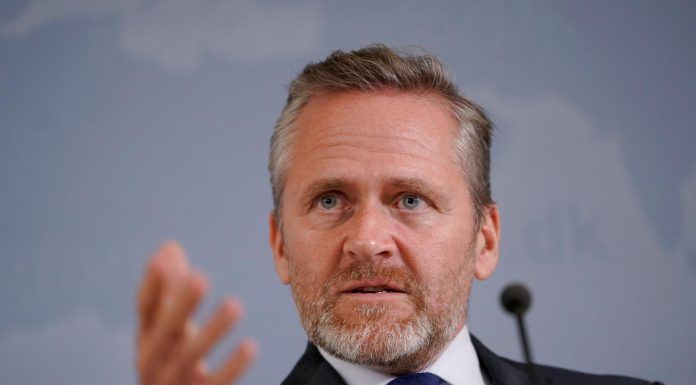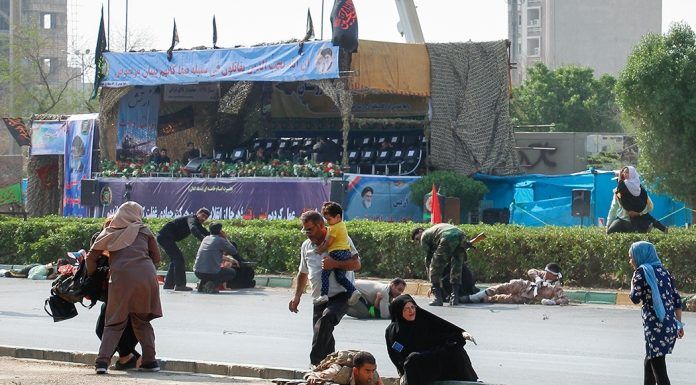By Emil Gjerding Nielson and Jacob Gronholt-Pedersen
COPENHAGEN, Oct 30 (Reuters) – Denmark said on Tuesday it suspected an Iranian government intelligence service had tried to carry out a plot to assassinate an Iranian Arab opposition figure on its soil.
The alleged plot, which Denmark’s foreign minister said he believed the Iranian government was behind, prompted the Nordic country to call for fresh European Union-wide sanctions against the Islamic Republic.
A Norwegian citizen of Iranian background was arrested in Sweden on Oct. 21 in connection with the plot and extradited to neighbouring Denmark, Swedish security police said.
The Norwegian has denied the charges and the Iranian government also denied any connection with the alleged plot.
The attack was meant to target the leader of the Danish branch of the Arab Struggle Movement for the Liberation of Ahvaz (ASMLA), Danish intelligence chief Finn Borch Andersen said.
ASMLA seeks a separate state for ethnic Arabs in Iran’s oil-producing southwestern province of Khuzestan. Arabs are a minority in Iran, and some see themselves as under Persian occupation and want independence or autonomy.
“We are dealing with an Iranian intelligence agency planning an attack on Danish soil. Obviously, we can’t and won’t accept that,” Andersen told a news conference.
Iranian foreign ministry spokesman Bahram Qasemi dismissed the accusations. “This is a continuation of enemies’ plots to damage Iranian relations with Europe at this critical time,” Tasnim news agency quoted him as saying.
The EU is trying to save big powers’ 2015 deal with Iran that curbed its nuclear activity in exchange for the lifting of international sanctions after the United States withdrew from the pact and reimposed far-flung financial penalties on Tehran.
Danish Prime Minister Lars Lokke Rasmussen called the planned attack “totally unacceptable” and said British Prime Minister Theresa May had voiced her support for Denmark during a meeting in Olso.
Foreign Minister Anders Samuelsen told a press conference he believed the Iranian government was behind the attempted attack.
CALL FOR EU SANCTIONS
“In light of the latest development, Denmark will now push for a discussion in the EU on the need for further sanctions against Iran,” Samuelsen said. Denmark’s ambassador in Tehran had been recalled for consultations, Samuelsen added.
“We congratulate the government of Denmark on its arrest of an Iranian regime assassin,” U.S. Secretary of State Mike Pompeo said in a tweet. “We call on our allies and partners to confront the full range of Iran’s threats to peace and security.”
Andersen said the arrested Norwegian citizen had denied charges in court of helping a foreign intelligence service plot an assassination in Denmark.
On Sept. 28, Danish police shut two major bridges to traffic and halted ferry services from Denmark to Sweden and Germany in a nationwide police operation to prevent a possible attack.
A few days earlier, the Norwegian suspect had been observed photographing and watching the Danish home of the ASMLA leader, police said.
In November 2017, Ahmad Mola Nissi, an Iranian exile who established ASMLA, was shot dead in the Netherlands. The Danish security service then bolstered police protection of the ASMLA leader in Denmark and two associates.
Last month, Iran summoned the envoys of the Netherlands, Denmark and Britain over a Sept. 22 shooting attack on a military parade in Khuzestan in which 25 people were killed.
Iran accused the three countries of harbouring Iranian opposition groups.
Another Arab opposition group, the Ahwaz National Resistance, and the Islamic State militant group both claimed responsibility for the parade attack, though neither has provided conclusive evidence to back up their claim.
Last week, diplomatic and security sources said France had expelled an Iranian diplomat over a failed plot to carry out a bomb attack on a rally in the Paris area by an exiled Iranian opposition group.
(Reporting by Emil Gjerding Nielson, Jacob Gronholt-Pedersen and Teis Jensen with additional reporting by Stine Jacobsen and Terje Solsvik, Bozorgmehr Sharafedin in London, John Irish in Paris; Editing by Mark Heinrich)



